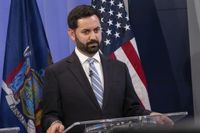California Governor Gavin Newsom stood before a packed auditorium in Los Angeles on August 14, 2025, declaring, “Today is Liberation Day in the State of California.” With union members, legislators, and abortion rights advocates in attendance, Newsom launched a campaign that could fundamentally reshape California’s congressional map—and, perhaps, the balance of power in Washington. The move, known as the Election Rigging Response Act, is California’s answer to a high-stakes national redistricting war, with both Democrats and Republicans vying for control of the U.S. House ahead of the 2026 midterm elections.
The plan, as Newsom announced, is bold: California will hold a special election on November 4, 2025, asking voters to approve redrawn congressional districts designed to give Democrats five additional seats in Congress. This direct response to Republican-led efforts in Texas—where President Donald Trump and Governor Greg Abbott are pushing for new maps to secure five more Republican seats—marks the first time a state outside Texas has officially entered the mid-decade redistricting fray.
“We can’t stand back and watch this democracy disappear district by district all across the country,” Newsom told the crowd, according to the Associated Press. “We are not bystanders in this world. We can shape the future.” For Newsom and California Democrats, the fight over congressional maps has become a proxy war with Trump and his allies. “Donald Trump, you have poked the bear and we will punch back,” Newsom declared, drawing cheers from supporters and signaling his willingness to take on the former president’s aggressive political maneuvers.
The context for this showdown is as much about principle as it is about power. Trump has demanded that Texas Republicans redraw their state’s map to create five new GOP-leaning House seats, a move that would eliminate several Democratic strongholds. According to Politico, Trump has also called for similar efforts in Missouri, Ohio, Illinois, Indiana, and Florida, hoping to cement a Republican majority in the House. Newsom, in response, framed the California plan as a defense of democracy and civil rights, warning that Trump’s tactics threaten American institutions and freedoms. “This is a serious moment, America. Wake up to what is going on,” Newsom said. “We have got to meet fire with fire.”
California’s proposed plan would temporarily sideline the state’s independent Citizens Redistricting Commission—an institution created in 2008, hailed as a bipartisan triumph, and currently composed of five Democrats, five Republicans, and four independents. Under legislation set to be introduced on August 18, California’s Democratic supermajority would draw new maps if Texas or other Republican-led states move forward with partisan redistricting. The new districts would remain in effect through the 2030 elections, after which, Democrats say, mapmaking power would revert to the independent commission.
But the move is not without controversy. Polling from Politico and the Citrin Center for Public Opinion Research reveals that most California voters prefer the current independent commission to a legislature-driven process. Critics argue that Newsom’s plan undermines the very reforms that made California’s elections fairer and less partisan. Charles Munger Jr., a key architect and financial backer of the independent commission, has vowed to fight the plan in court and at the ballot box. “Any attempt to undermine the nonpartisan California Redistricting Commission will be strongly opposed in the courts and at the ballot box,” Munger’s spokesperson Amy Thoma Tan told Politico, adding that his team “have the resources necessary” to counter Newsom’s gerrymandering efforts.
Former Governor Arnold Schwarzenegger, who championed the creation of the independent commission, is also expected to campaign against the plan. His spokesperson Daniel Ketchell told Politico, “He calls gerrymandering evil, and he means that. He’s opposed to what Texas is doing, and he’s opposed to the idea that California would race to the bottom to do the same thing.” The National Republican Congressional Committee has echoed these criticisms, with spokesperson Christian Martinez calling Newsom’s move a “stunt” designed to “consolidate radical Democrat power, silencing California voters, and propping up his pathetic 2028 presidential pipe dream.”
Financial concerns further complicate the effort. Redistricting California would be an expensive undertaking, with estimates ranging from $4 million in San Joaquin County to $16 million in Riverside County. The state legislature faces an August 22 deadline to pass the necessary bills, meaning lawmakers—who hold supermajorities in both chambers—must act quickly after returning from summer recess.
Despite the hurdles, Newsom and his allies remain undeterred. The campaign has garnered backing from the House Democrats’ principal super PAC and Democratic megadonor Bill Bloomfield. Newsom has called on other blue states to join the fight, urging, “We need to stand up—not just California. Other blue states need to stand up.” The proposed new maps, which are expected to be released in the coming days, reportedly target Republican-held districts such as the 1st, 3rd, and 41st, aiming to flip them to Democratic control, according to a chart obtained by Politico.
The ripple effects of California’s plan are already being felt beyond its borders. Texas Democrats, who fled their state on August 3 to prevent a quorum and block the Republican redistricting vote, have announced they may return home now that California has unveiled its countermeasure. State Representative Gene Wu, leader of the Texas House Democratic Caucus, said, “As Democrats across the nation join our fight to cause these maps to fail their political purpose, we’re prepared to bring this battle back to Texas under the right conditions and to take this fight to the courts.” Texas Governor Abbott, for his part, has threatened to call special session after special session until the GOP plan passes, warning, “There will be no reprieve for the derelict Democrats who fled the state and abandoned their duty to the people who elected them.”
The partisan struggle over redistricting has drawn national attention, with leaders in states from Florida to New York considering their own responses. In Missouri, the state Senate has received a $46,000 invoice for redistricting software and staff training, highlighting just how widespread and costly this battle has become. As the Associated Press notes, the fight is shaping up to be a “proxy war” for the 2026 elections, with control of the U.S. House potentially hinging on just a handful of seats.
Outside Newsom’s Los Angeles event, U.S. Border Patrol agents conducted patrols, drawing condemnation from the governor and others. “We’re here making Los Angeles a safer place since we don’t have politicians that will do that,” said Gregory Bovino, chief of the patrol’s El Centro sector, to KTTV. The juxtaposition of federal agents and “Defend Democracy” placards underscored the tense, high-stakes atmosphere surrounding the redistricting debate.
As California prepares for its November special election, the state finds itself at the epicenter of a national conflict over who draws the lines—and who ultimately holds power. The outcome could set a precedent for other states and shape the future of American democracy for years to come.




